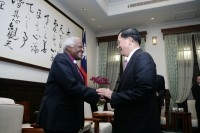President Chen Shui-bian Meets with Nobel Peace Laureate Desmond Tutu

President Chen Shui-bian on April 24 met with Nobel Peace Prize Winner The Most Reverend Desmond M. Tutu and his wife. President Chen extended a warm welcome to the couple on behalf of the government and 23 million people of the ROC (Taiwan). He also shared Taiwan's experience in seeking the truth about the 228 Incident, expressing his hopes that by bearing in mind the lessons of history, ethnic reconciliation can be achieved.
President Chen first praised Archbishop Tutu as the world's conscience for his unceasing work throughout this life in supporting justice and reconciliation. He said that Archbishop Tutu has stood up in the face of authority and he praised his unwavering calls for the dismantling of the apartheid system in South Africa. Archbishop Tutu's efforts ultimately led to the emergence of a new democracy in South Africa. In 1984, he was awarded the Nobel Peace Prize for his lifelong efforts. The president noted that from 1995 to 1998, Archbishop Tutu served as the chairman of South Africa's Truth and Reconciliation Commission. He added that on this visit to Taiwan, Archbishop Tutu has had the opportunity to visit the most important places in the human rights movement on Taiwan. He has also met with human rights leaders on Taiwan, which will help in the sharing of experiences between the two countries in their respective pursuit of human rights.
The president said that it has been 16 years since the last general sentence commutation and amnesty on Taiwan. This year marks the 60th anniversary of the 228 Incident and the 20th anniversary of the lifting of martial law. As Taiwan's leader, he last week instructed the Executive Yuan to look into implementing another amnesty. He said he hopes to provide lenient treatment to people who have committed legal infractions, providing them a chance to start their lives over again. The sentence commutation, however, would not apply to persons who have committed crimes that have harmed the core of society or who are unrepentant.
The president stressed that Taiwan and South Africa are both countries that were under authoritarian rule before becoming democracies. He said that South Africa's democratic achievements and its experience in the creation of the Truth and Reconciliation Commission offer valuable reference for Taiwan. President Chen furthermore stressed that without forgiveness, there is no future. However, without the truth, there cannot be reconciliation. Therefore, he said that it is extremely important to find the truth. Earlier in the day, Archbishop Tutu visited the 228 Memorial Hall and the Machangding memorial area. President Chen was instrumental in the creation of both during his term as Taipei City Mayor. He said that the establishment of these memorials symbolizes that the government is willing to face history. In addition to apologizing many times and erecting monuments and memorial halls, the government in recent years has provided compensation to families of victims of the 228 Incident and has restored good honor to the names of those who were victimized in the incident, he said.
During their discussion, President Chen listened carefully to Archbishop Tutu's description of South Africa's experiences in the pursuit of truth and reconciliation, saying that Taiwan will refer to this experience in its own efforts to achieve truth and reconciliation.
Vice Minister of Foreign Affairs Javier Ching-shan Hou accompanied Archbishop Tutu to the Presidential Building in the afternoon to meet President Chen. Also in attendance was Deputy Secretary-General to the President Chen Chi-mai.